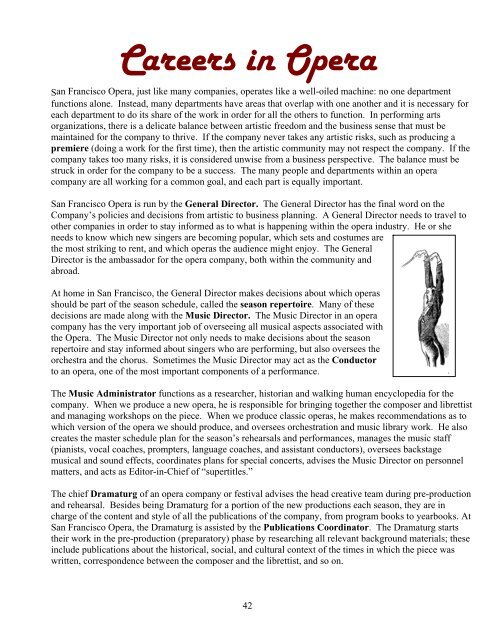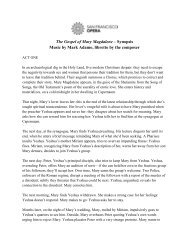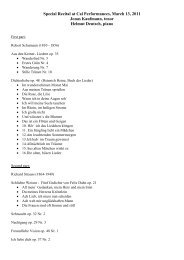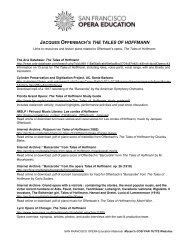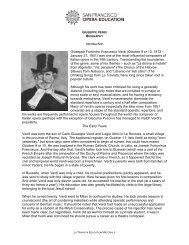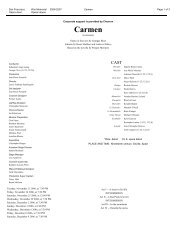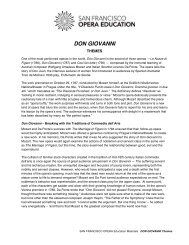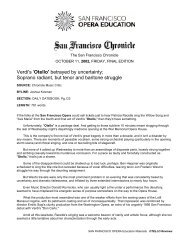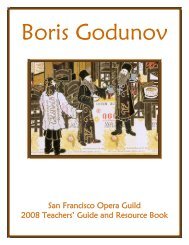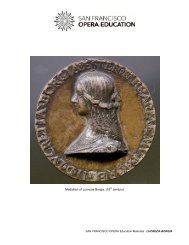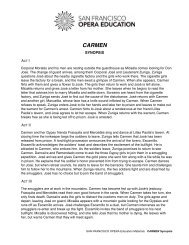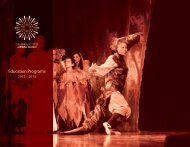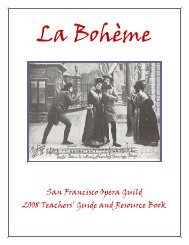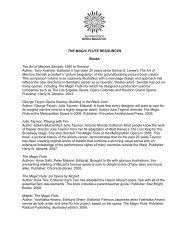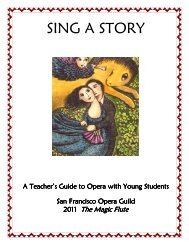The Rake's Progress Teachers Guide - San Francisco Opera
The Rake's Progress Teachers Guide - San Francisco Opera
The Rake's Progress Teachers Guide - San Francisco Opera
You also want an ePaper? Increase the reach of your titles
YUMPU automatically turns print PDFs into web optimized ePapers that Google loves.
Careers in <strong>Opera</strong><br />
<strong>San</strong> <strong>Francisco</strong> <strong>Opera</strong>, just like many companies, operates like a well-oiled machine: no one department<br />
functions alone. Instead, many departments have areas that overlap with one another and it is necessary for<br />
each department to do its share of the work in order for all the others to function. In performing arts<br />
organizations, there is a delicate balance between artistic freedom and the business sense that must be<br />
maintained for the company to thrive. If the company never takes any artistic risks, such as producing a<br />
premiere (doing a work for the first time), then the artistic community may not respect the company. If the<br />
company takes too many risks, it is considered unwise from a business perspective. <strong>The</strong> balance must be<br />
struck in order for the company to be a success. <strong>The</strong> many people and departments within an opera<br />
company are all working for a common goal, and each part is equally important.<br />
<strong>San</strong> <strong>Francisco</strong> <strong>Opera</strong> is run by the General Director. <strong>The</strong> General Director has the final word on the<br />
Company’s policies and decisions from artistic to business planning. A General Director needs to travel to<br />
other companies in order to stay informed as to what is happening within the opera industry. He or she<br />
needs to know which new singers are becoming popular, which sets and costumes are<br />
the most striking to rent, and which operas the audience might enjoy. <strong>The</strong> General<br />
Director is the ambassador for the opera company, both within the community and<br />
abroad.<br />
At home in <strong>San</strong> <strong>Francisco</strong>, the General Director makes decisions about which operas<br />
should be part of the season schedule, called the season repertoire. Many of these<br />
decisions are made along with the Music Director. <strong>The</strong> Music Director in an opera<br />
company has the very important job of overseeing all musical aspects associated with<br />
the <strong>Opera</strong>. <strong>The</strong> Music Director not only needs to make decisions about the season<br />
repertoire and stay informed about singers who are performing, but also oversees the<br />
orchestra and the chorus. Sometimes the Music Director may act as the Conductor<br />
to an opera, one of the most important components of a performance.<br />
<strong>The</strong> Music Administrator functions as a researcher, historian and walking human encyclopedia for the<br />
company. When we produce a new opera, he is responsible for bringing together the composer and librettist<br />
and managing workshops on the piece. When we produce classic operas, he makes recommendations as to<br />
which version of the opera we should produce, and oversees orchestration and music library work. He also<br />
creates the master schedule plan for the season’s rehearsals and performances, manages the music staff<br />
(pianists, vocal coaches, prompters, language coaches, and assistant conductors), oversees backstage<br />
musical and sound effects, coordinates plans for special concerts, advises the Music Director on personnel<br />
matters, and acts as Editor-in-Chief of “supertitles.”<br />
<strong>The</strong> chief Dramaturg of an opera company or festival advises the head creative team during pre-production<br />
and rehearsal. Besides being Dramaturg for a portion of the new productions each season, they are in<br />
charge of the content and style of all the publications of the company, from program books to yearbooks. At<br />
<strong>San</strong> <strong>Francisco</strong> <strong>Opera</strong>, the Dramaturg is assisted by the Publications Coordinator. <strong>The</strong> Dramaturg starts<br />
their work in the pre-production (preparatory) phase by researching all relevant background materials; these<br />
include publications about the historical, social, and cultural context of the times in which the piece was<br />
written, correspondence between the composer and the librettist, and so on.<br />
42


